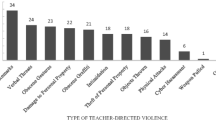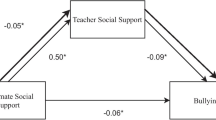Abstract
Teacher-directed violence, or violence found in a school setting that involves teacher victimization (Espelage et al. in The American Psychologist, 68(2), 75–87, 2011), is a relatively new area of study in education. Teacher-directed violence or teacher victimization includes obscene gestures/remarks, harassment, verbal threats, and theft of personal property. Research on the topic began in the past decade, but still there is limited information about teacher-directed violence, particularly in the USA. Researchers need to understand how much and what types of violence teachers are subjected to in order to develop policy reform (Espelage et al. in The American Psychologist, 68(2), 75–87, 2011). Additionally, research has not examined how teachers cope after experiencing violence, such as to whom teachers turn for social support after experiencing violence, and if social support is effective in helping them cope. The current study examined type and frequency of teacher-directed violence, to whom teachers go to for social support, and the frequency of support from different sources, as well as perceived social support of teachers who experience teacher-directed violence compared to teachers who do not experience violence. This study also examined stress related to teacher-directed violence. Results revealed that teachers experience verbal violence most often, teachers go to another teacher or spouse/significant other for support, and there were no significant differences in stress for teachers who did and did not experience teacher-directed violence.


Similar content being viewed by others
References
Cohen, S., & Wills, T. A. (1985). Stress, social support, and the buffering hypothesis. Psychological Bulletin, 98(2), 310–357. doi:10.1037/0033-2909.98.2.310.
Davidson, L. M., & Demaray, M. K. (2007). Social support as a moderator between victimization and internalizing-externalizing distress from bullying. School Psychology Review, 36(11), 383–405.
Dinkes, R., Kemp, J., Baum, K., & Snyder, T. (2009). Indicators of school crime and safety,(NCES 2010–012). Washington, DC: National Center for Education Statistics, Institute of Education Sciences. US Department of Education.
Dzuka, J., & Dalbert, C. (2007). Student violence against teachers. European Psychologist, 12(4), 253–260. doi:10.1027/1016-9040.12.4.253.
Espelage, D., Anderman, E. M., Brown, V. E., Jones, A., Lane, K. L., McMahon, S. D., Reddy, L. A., & Reynolds, C. R. (2011). Understanding and preventing violence directed against teachers: recommendations for a national research, practice, and policy agenda. The American Psychologist, 68(2), 75–87. doi:10.1037/a0031307.
Fimian, M. (1988) Teacher Stress Inventory [Measurement instrument]. Retrieved from: http://www.instructionaltech.net/TSI/
Fiore, J., Becker, J., & Coppel, D. B. (1983). Social network interactions: a buffer or a stress. American Journal of Community Psychology, 11(4), 423–439. doi:10.1007/BF00894057.
Frey, A. J., Lingo, A., & Nelson, C. M. (2011). Implementing positive behavior support in elementary schools. In M. R. Shinn & H. M. Walker (Eds.), Interventions for achievement and behavior problems in a three tier model, including RTI. Bethesda, MD: National Association of School Psychologists.
Holt, M. K., & Espelage, D. L. (2007). Perceived social support among bullies, victims, and bully-victims. Journal of Youth and Adolescence, 36(8), 984–994. doi:10.1007/s10964-006-9153-3.
Kauppi, T., & Pörhölä, M. (2012). School teachers bullied by their students: teachers’ attributions and how they share their experiences. Teaching and Teacher Education, 28(7), 1059–1068. doi:10.1016/j.tate.2012.05.009.
Klassen, R. M., & Chiu, M. M. (2011). The occupational commitment and intention to quit of practicing and pre-service teachers: influence of self-efficacy, job stress, and teaching context. Contemporary Educational Psychology, 36(2), 114–129. doi:10.1016/j.cedpsych.2011.01.002.
Kochenderfer-Ladd, B., & Skinner, K. (2002). Children’s coping strategies: moderators of the effects of peer victimization? Developmental Psychology, 38(2), 267–278. doi:10.1037/0012-1649.38.2.267.
Kokkinos, C. M. (2007). Job stressors, personality and burnout in primary school teachers. British Journal of Educational Psychology, 77(1), 229–243. doi:10.1348/000709905X90344.
Kulik, J. A., & Mahler, H. I. M. (1990). Stress and affiliation research: on taking the laboratory to health field settings. Annals of Behavioral Medicine, 12, 106–111. doi:10.1207/s15324796abm1203_2.
Lakey, B., & Cohen, S. (2000). Social support theory and measurement. Social support measurement and intervention: a guide for health and social scientists, 29–52. Oxford: Oxford University Press.
Malecki, C. K., & Demaray, M. K. (2002). Measuring perceived social support: development of the child and adolescent social support (CASSS). Psychology in the Schools, 39(1), 1–18. doi:10.1002/pits.10004.
McMahon, S. D., Martinez, A., Espelage, D., Rose, C., Reddy, L. A., Lane, K., Anderman, E. M., Reynolds, C. R., Jones, A., & Brown, V. (2014). Violence directed against teachers: results from a national survey. Psychology in the Schools, 51(7), 753–766. doi:10.1002/pits.21777.
Mooij, T. (2011). Secondary school teachers’ personal and school characteristics, experience of violence and perceived violence motives. Teachers and Teaching: Theory and Practice, 17(2), 227–253. doi:10.1080/13540602.2011.539803.
Ozkilic, R., & Kartal, H. (2012). Teachers bullied by their students: how their classes influenced after being bullied? Procedia-Social and Behavioral Sciences, 46, 3435–3439. doi:10.1016/j.sbspro.2012.06.080.
Reddy, L. A., Espelage, D., McMahon, S. D., Anderman, E. M., Lane, K. L., Brown, V. E., Reynoldsg, C. R., Jones, A., & Kanrich, J. (2013). Violence against teachers: case studies from the APA task force. International Journal of School & Educational Psychology, 1(4), 231–245. doi:10.1080/21683603.2013.837019.
Tinsley, H. A., & Weiss, D. J. (1975). Interrater reliability and agreement of subjective judgements. Journal of Counseling Psychology, 22, 358–376.
Türküm, A. S. (2011). Social supports preferred by the teachers when facing school violence. Children and Youth Services Review, 33(5), 644–650. doi:10.1016/j.childyouth.2010.11.005.
Author information
Authors and Affiliations
Corresponding author
Ethics declarations
Conflict of Interest
The authors declare that they have no conflict of interest.
Ethical Approval
All procedures performed in studies involving human participants were in accordance with the ethical standards of the institutional and/or national research committee and with the 1964 Helsinki declaration and its later amendments or comparable ethical standards.
Informed Consent
Informed consent was obtained from all individual participants included in the study.
Rights and permissions
About this article
Cite this article
Bounds, C., Jenkins, L.N. Teacher-Directed Violence in Relation to Social Support and Work Stress. Contemp School Psychol 20, 336–344 (2016). https://doi.org/10.1007/s40688-016-0091-0
Published:
Issue Date:
DOI: https://doi.org/10.1007/s40688-016-0091-0




